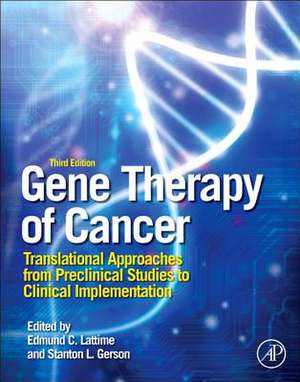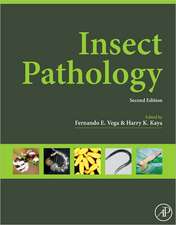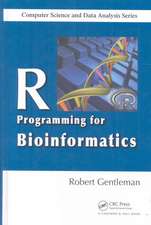Gene Therapy of Cancer: Translational Approaches from Preclinical Studies to Clinical Implementation
Editat de Edmund C. Lattime, Stanton L. Gersonen Limba Engleză Hardback – 13 oct 2013
Cancer gene therapy, like cancer therapy in general, is evolving rapidly, testing new concepts, targets and pathways, evoking new technologies, and passing new regulatory hurdles. Its essence, however, has not changed: the hope and challenges of returning altered genes to normal, using targeted gene expression to alter the function of both tumor and microenvironment, and in some cases normal cells, and delivering functionally important genes to specific cell types to increase sensitivity to killing or to protect normal cells from cancer therapies.
In some instances, gene therapy for cancer forms a continuum from gene repair through the use of molecularly modified cells; the use of viral and non-viral vector based gene delivery to both tumor and tumor microenvironment; the use of viral and gene based vaccines; and development of new gene-based therapeutics. The unique mechanistically chosen vector platforms are at the heart of this technology because they allow for direct and selective cell death and transient to sustained delivery of vaccine molecules or molecules that affect the microenvironment, vasculature, or the immune response.
- Explains the underlying cancer biology necessary for understanding proposed therapeutic approaches
- Presents in-depth description of targeting systems and treatment strategies
- Covers the breadth of gene therapy approaches including immunotherapeutic, drug resistance,oncolytic viruses, as well as regulatory perspectives from both the NCI and FDA
Preț: 827.63 lei
Preț vechi: 1141.67 lei
-28% Nou
Puncte Express: 1241
Preț estimativ în valută:
158.39€ • 162.20$ • 131.75£
158.39€ • 162.20$ • 131.75£
Carte tipărită la comandă
Livrare economică 12-26 martie
Preluare comenzi: 021 569.72.76
Specificații
ISBN-13: 9780123942951
ISBN-10: 0123942950
Pagini: 554
Ilustrații: illustrations
Dimensiuni: 216 x 276 x 30 mm
Greutate: 1.84 kg
Ediția:Revised
Editura: ELSEVIER SCIENCE
ISBN-10: 0123942950
Pagini: 554
Ilustrații: illustrations
Dimensiuni: 216 x 276 x 30 mm
Greutate: 1.84 kg
Ediția:Revised
Editura: ELSEVIER SCIENCE
Public țintă
Academic, medical, and pharmaceutical researchers and graduate students across the translational fields of cancer research: genetics, biology, pharmacology, immunology, and oncologyCuprins
Introduction; Overview of Viral and Non-Viral Vector Technologies; DNA Integration for Monitoring Outcome in Gene Therapy; Multiple Treatment Cycles and Gene Therapy; RNA interference-based therapy for cancer; Targeted systemic delivery of therapeutic siRNA; Lentiviral-vector Common Integration Sites; Selective Replicating Adenovirus and Tumor Necrosis; Cancer Suicide Gene Therapy; Adenovirus-retrovirus Hybrid Vectors ; Electroporation gene therapy; Biomaterials-based technologies for therapeutics and imaging; RNA Inhibition gene therapy; Monocytogenes-based DNA Delivery System; Toxin based Cancer Gene Therapy; Overview: Rationale use of oncolytic virus in clinical applications; Clinical development directions in oncolytic viral therapy; Selectively replicating herpes simplex viral vector; Oncolytic Vaccinia Virus for Cancer Therapy; Lister strain Vaccinia Virus; Modification of Mammalian Reoviruses; Systemic Delivery of Oncolytic adenoviruses ; HIF-activated Oncolytic Adenoviruses; Overview of Immune Targets and Pathways; Overview of Gene Therapy with Gene-modified T Cells; Genetically Engineered (TCR) T cells for adoptive therapy; Viral-based Strategies for Combined Vaccine/microenvironment Modulation; Dendritic Cell Vaccines; Recombinant Poxvirus Vaccines; Provenge® and Genetic Fusion Vaccines; Lentivector Vaccines; In vivo Immune Gene Therapy of Solid Tumours; Chemotherapy Delivered after Viral Immunogene Therapy; Overview: selecting effective targets for gene therapy of cancer; Targeting Telomerase-expressing Cancer Cells; Adenovirus-mediated shRNAs ; Adenovirus-mediated SOCS3 Gene Transfer ; p53-based Cancer Therapy; Strategies for tumor-directed delivery of siRNA; Overview of Drug Resistance and Manipulation; Clinical Trials using LV P140KMGMT for Gliomas; Delivery of Liposome-mediated MGMT-siRNA; Cytidine Deaminase Gene Therapy for Recurrent Cancer; Tissue Specific Gene Therapy; Radiation Therapy; Overview of angiogenesis and target identification; Combination of Notch and Ephrin- targeted Therapy; Effects of sustained VEGF blockade on the tumor microenvironment; Clinical studies of Aflibercept (VEGF Trap); Overview of Molecular Imaging Strategies Using Gene-based Vectors; NIS for Radio Gene Therapy; Genetically Engineered Salmonella; NIS Imaging in Cancer; Targeted systemic gene therapy and molecular imaging; Issues and Solutions in Moving Gene-therapy Approaches in Early Phase Trials; Safety and Innovation in Cancer Gene Therapy; Issues and Solutions in Moving Gene-therapy Approaches to Late-phase Trials; FDA Review Process for Cancer Gene Therapy
Recenzii
"The Third Edition…provides crucial updates on the basic and applied sciences of gene therapy. It offers a comprehensive assessment of the field including the areas of suicide gene therapy, oncogene and suppressor gene targeting, immunotherapy, drug resistance gene therapy, and the genetic modification of stem cells." --Anticancer Research 34, 2014
"Gene therapy for cancer encompasses reforming genes gone bad, using gene expression to alter the function of both tumor and microenvironment, increasing the sensitivity of cancer cells to killer drugs, and protecting normal cells from such therapies. The studies here cover viral and non-viral vector methodologies: targets and approaches, oncolytic viruses, immunotherapeutics, drug resistance and metabolism gene therapy, cancer therapy imaging vectors, and issues in trail design review and approval." --Reference & Research Book News, December 2013
"Gene therapy for cancer encompasses reforming genes gone bad, using gene expression to alter the function of both tumor and microenvironment, increasing the sensitivity of cancer cells to killer drugs, and protecting normal cells from such therapies. The studies here cover viral and non-viral vector methodologies: targets and approaches, oncolytic viruses, immunotherapeutics, drug resistance and metabolism gene therapy, cancer therapy imaging vectors, and issues in trail design review and approval." --Reference & Research Book News, December 2013











